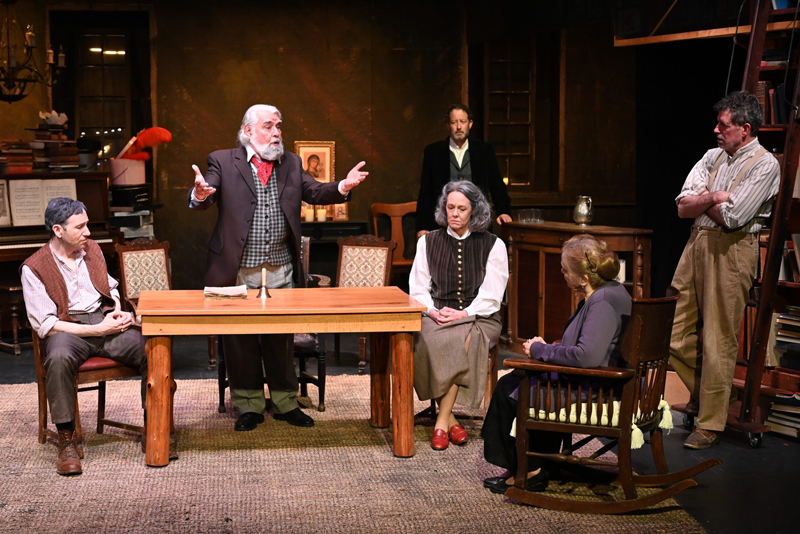
As you walk into the Bridge Street Theatre’s stage production of Anton Chekhov’s play, Uncle Vanya, you can buy a shot of vodka for $1. My suggestion is – take one. The vodka will help you handle the feeling of existential dread and misery that awaits you after watching this Russian “comedy”. I opted for a can of lemon seltzer water, and now I’m up late at night wondering how to endure my remaining years on this earth. A shot of vodka would have helped stop the thinking.
The play is excellently and professionally produced and directed, and the acting is superb. The stage is set with multiple tiers of indoor and outdoor spaces. For those who saw last year’s production of The Glass Menagerie, you may remember the actress who played Laura is now playing Yelena, the young and beautiful wife of the professor. The two roles could not be more opposite, highlighting her talents and range as an actress.
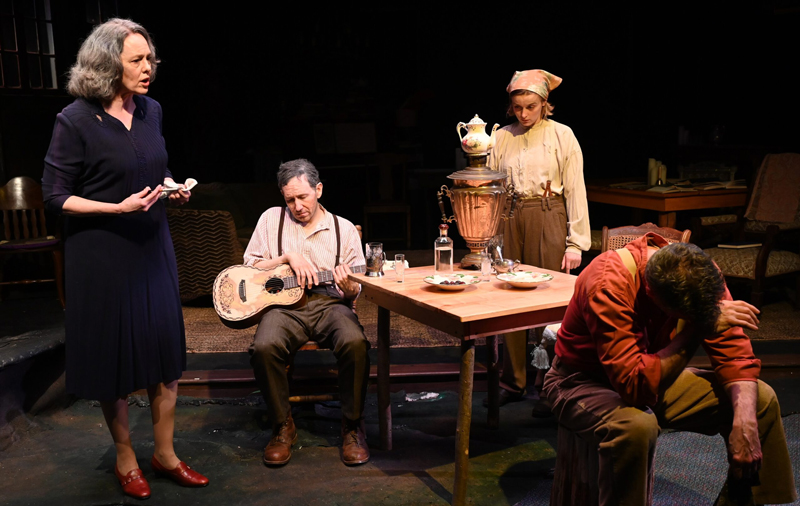
Steven Patterson, as Uncle Vanya, sleeps on the couch as the audience enters the room. Steven Patterson’s Uncle Vanya, along with Doctor Astrov, played by Richard Neil, perform a range of emotions. These drunken middle-aged men once had dreams and desires, but now they fight for the attention and affection of the beautiful Yelena. Doctor Astrov overlooks the “plain” and hard-working Sonja, played by Abby Burris. Sonja represents hope for the future. She admires the doctor’s charisma, but her love is not returned. Michael Durkin’s character is the self-absorbed professor Serebryakov, who is revered by Maman, or Mirya, played by Renée Hewitt. The professor is out-of-touch with reality and his performance helps you understand why the Russians revolted against the monarchy and intelligentsia not many years after this play was written. The older down-to-earth grandmother, Nana, is played by Eileen Schuyler, who represents the traditional, loving, and caring ways of old Russia. Telegin, or Waffles, played by Eamon Martin, is a cute stumbling and mumbling farm worker, who plays the guitar and gives the play some needed levity.
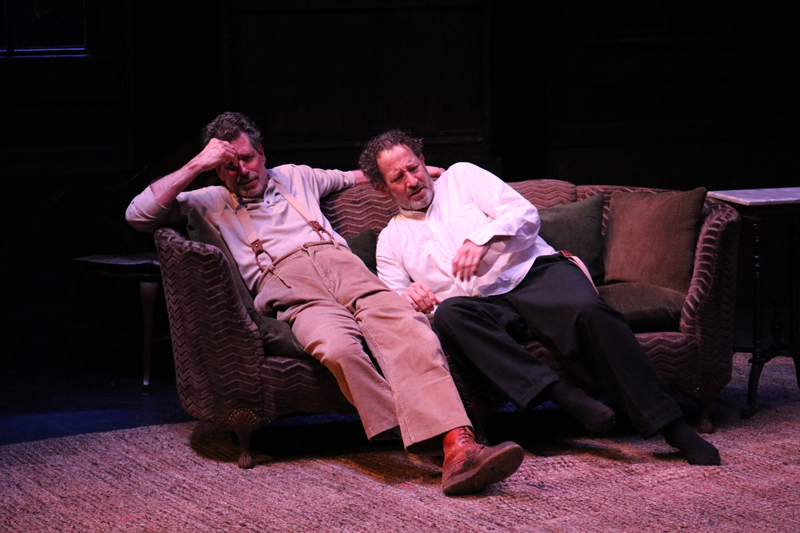
The play is over one hundred years old, however the recent 2020 adaptation by Conor McPherson makes Uncle Vanya as sarcastic and snarky as any instagram meme. Uncle Vanya is a dark, dark comedy.
This is the perfect weather to slit your wrists!
Uncle Vanya
Yelaena, a beautiful young woman, wearing gowns and furs, with a life of leisure plops down on the couch and when asked, “Are you happy?” responds, “Of course I’m not happy.”
The young wife of the professor is not happy. The intelligentsia who write dissertations that no one reads or understands are not happy. The farm workers are not happy. The peasants are barely alive and the factory workers’ limbs are chopped off by machines. The forests are being decimated. It is a dark time in Russian history.
At forty-seven, Uncle Vanya feels that youth and love passed him by. He missed his opportunities. However, when he wants to play the victim, and say that he squandered his life for the sake of others, he is quickly reminded that it is he who made the choices in his life. He is also reminded that as a man, he had more choices than the women around him.
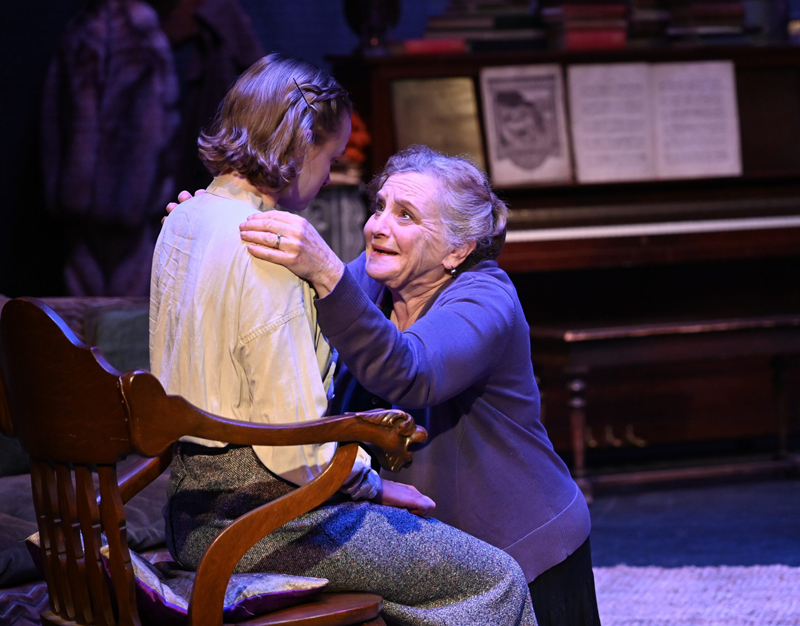
The women in the play are practical, rational, and pragmatic. The men have wild mood swings of emotions from anger to lust to self-absorbed narcissism while the female characters look after each other, run the household, and tell the men not to drink.
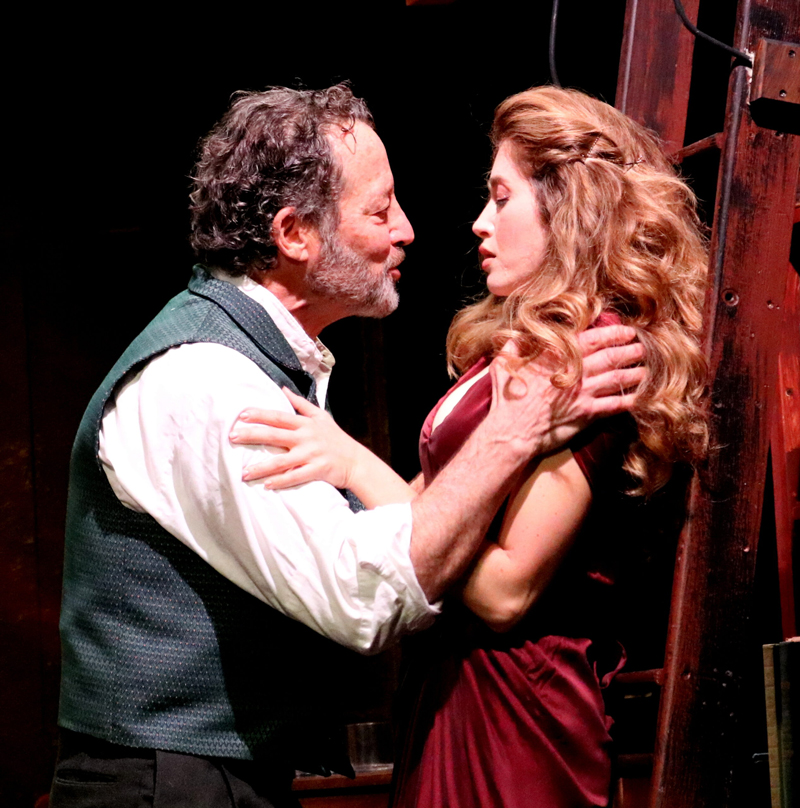
The characters of Uncle Vanya would laugh and spit at your driftwood green-patina painted sign saying, “Live. Laugh. Love.” They know it’s a facade.
This is not a savor-every-precious-moment-of-life play. Our lives are spent toiling in the fields, suffering long winters, and paying bills. We can rest when we are in the grave. Only then, maybe, we will get a sense of peace.
Yet, with all of this misery, Uncle Vanya is refreshing. On social media, we are made to believe that happiness is just a click away. When none of the get-happy-quick schemes work, how do we feel? Are we more depressed than before? Uncle Vanya reminds us that being unhappy is also part of the human experience.
In Uncle Vanya’s provincial Russia, life is not happiness; life is endurance. Life must be painfully endured. “Do not leave me or I will kill you.” said Sonja to her Uncle Vanya.
Doctor Astrov said that in one hundred years from the time of this play, the characters will all be dead, and people in the future will have this happiness thing all figured out.
The audience laughed.
Uncle Vanya is wonderfully miserable. I loved it!
See it this weekend and next at the Bridge Street Theatre. Tickets available here.

And at a dollar a shot it’s the cheapest place to drink in the county to boot!
Thanks, Trixie! It’s always a joy to have you in the house.